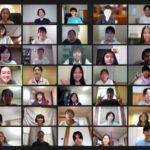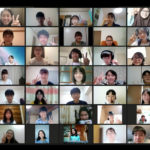Hiroshima Declaration/ Group J
Preamble
We, the 59 participants of the 6th Hiroshima Junior International Forum, held from August 17th to 20th 2021, collaborated together online from 14 countries around the world. Our aim was to learn about and discuss the abolition of nuclear weapons as well as peacebuilding.
The Treaty on the Prohibition of Nuclear Weapons (TPNW) came into force in January of this year. This will be an integral and essential step towards the abolition of nuclear weapons. However, the division between nuclear weapon states and non-nuclear weapon states has yet to be overcome. In addition, people around the world continue to be displaced by prolonged civil wars, terrorist attacks as well as natural disasters. The COVID-19 pandemic continues to pose further challenges for the population of the world.
Under such circumstances, we are acutely aware of the importance of the need for the younger generation to act upon what we have learned here. Furthermore, we are convinced of the need to deepen our understanding of the challenges facing us and the current efforts being undertaken to meet those challenges. Having strong support from the Hiroshima community, we, the youth of today, participated in this forum as an important step for achieving such goals. Spending four days together, we learned from experts in this field, shared our knowledge, and gained inspiration from each other.
In this Hiroshima Declaration, we have compiled the results and fruits of our learning and discussion. The Hiroshima Declaration is a proposal to local and national government leaders, business leaders around the world, and the rest of society, as well as an action plan for us, the participants.
<Challenges and Solutions for Abolition of Nuclear Weapons>
The first issue we recognize is that many people do not have enough knowledge and are not concerned about nuclear weapons, because of national history and politics. People in different countries have different perceptions and ideas about nuclear weapons, so it is difficult to reach a unified understanding. As a solution to this issue, we suggest spreading education about nuclear weapons in society and schools and making everyone have an improved understanding of nuclear weapons. We should try not to understate the power of nuclear weapons to let people correctly understand nuclear weapons and their dangers, free of the possibilities of distorted knowledge. We also suppose that it is effective to use the Internet to educate people about nuclear weapons and the importance of peace with means that facilitate people getting interested in nuclear weapons such as videos or cartoons.
The second issue that we recognize is that the way of thinking about nuclear weapons is different depending on individuals, sometimes influenced by their own countries. Hence, to achieve the abolition of nuclear weapons, we should listen to the voices around the world and unite the mind to abolish them. To do so, one of the solutions is to make activities where we can discuss peace with people around the world without language barriers using the function or devices that can translate into common languages each of us understands.
<Our Role for Abolition of Nuclear Weapons>
We have found 2 roles that we, the young people, have for the abolition of nuclear weapons. First, we can share information about nuclear weapons through social media such as Twitter, Instagram, and so on, which young people tend to be good at using. For instance, we can let other people with little knowledge about nuclear weapons learn about how destructive nuclear weapons are and how much the victims suffered during the time when an atomic bomb was used by posting the testimony of hibakusha on the Internet. Second, we should make an effort to tell as many people as possible that the possession of nuclear weapons itself is a menace to all human beings, forcing us to be afraid of those weapons being used or exploding by accident. We should consider this fact as our own problem, not someone else’s problem. Overall, it is required that we, the young people, should use our power to influence and inspire others, pursuing the situation where we achieve the necessary consensus to eradicate nuclear weapons and any other destructive weapons in order to realize a world we and even the next generation can feel safe to live in.
<The Role of Hiroshima for Abolition of Nuclear Weapons>
We insist that the role of Hiroshima for the abolition of nuclear weapons is to enlighten as many people as possible, as to how inhumane nuclear weapons are, revealing even the darkest and cruelest part of reality. In truth, there are still a number of people who justify the use and possession of nuclear weapons, relying on the nuclear deterrence theory. They believe that peace cannot be realized without nuclear weapons. However, most of them are unaware of how inhumane nuclear weapons are. Due to the bombings in 1945, a tremendous number of lives were lost, as well as many people suffering from the after-effects of the radiation emitted by the bombings. They all are obliged to face the reality, and it is Hiroshima that should take an initiative in letting them have an opportunity to learn about it. Only with the consensus that nuclear weapons are absolute evil can we achieve the abolition of nuclear weapons.
<Challenges and Solutions for Peacebuilding>
We recognize two grave barriers to peacebuilding. The first one is the hatred among us, which is usually attributed to a sense of not accepting the differences among us. These differences include those in racial backgrounds, ways of thinking, religion, and so on. As nobody living in this world is the same as others, we cannot live peacefully without understanding and embracing differences. To overcome this challenge, we suggest that we should look at each country objectively, respect the history of other countries and interact with people with various backgrounds, which can broaden our views while eliminating preconceived notions about other countries.
The second one is a lack of education. There are some children in the world who do not have access to education at all because of many factors such as military conflict or a lack of basic needs. Not receiving education leads to a situation where one fails to learn that violence is evil, which makes the realization of world peace almost impossible. On top of this, even in developed countries, the unsuccessful spread of peace education can be a problem: in the case of Japan, peace education is common in only some prefectures like Hiroshima, Nagasaki, and Okinawa. To overcome this barrier, it is highly necessary that we make an effort to improve the educational environments in developing countries and spread peace education including positive and negative all over Japan and the world.
<Our Role for Peacebuilding>
We propose 3 things as the roles of the young generation. First, we should learn about the tragedy of the past and the importance of peace. As history shows, we, human beings, have repeated the same tragedy of wars. It is vital that we learn lessons from the past in order not to repeat the tragedy any longer. Second, we should learn to be friendly and kind to others. While this may seem simple, this is the most fundamental way of building world peace. Looking at the internet, there are a number of people who say something critical, taking advantage of anonymity. This prevents us from getting along, thus leading to an antagonistic atmosphere. Third, we should participate in events designed for young people around the world to share our ambitions towards world peace and the cultural differences among us, which helps to strengthen bonds between us.
<The Role of Hiroshima for Peacebuilding>
We propose two missions that we believe Hiroshima has for peacebuilding. First, we believe that Hiroshima can promote more online and offline activities about peace and spread the knowledge of peace as well as some traditional Japanese culture because Hiroshima is a city that has overcome tragic difficulties of the past, which symbolizes peace. It attracts a large number of visitors from abroad every year. We can take this opportunity to let more people know about Japan. Second, we believe that Hiroshima can take an initiative internationally because of universities in Hiroshima recruiting a lot of international students and the appealing local history, culture, and industry attracting many foreigners, both of which make the city full of international elements.
Closing
We participants are now highly aware that specialized knowledge is fundamental for us to understand the challenges that we face and to be able to propose effective solutions. We have also reaffirmed that it is important to mutually respect each other while discussing issues and deriving solutions. While we recognized the importance of outreach, we also grew to realize the strategic relevance that we should spread our message by using the appropriate tools and methods.
We know that our responsibilities do not end with the announcement of the Hiroshima Declaration. We know we need to put the action plan presented here into practice. When we interact with people to share our suggestions, we know we need to collaborate with like-minded people, but we also need to have dialogues with people who hold different perspectives and opinions to seek better solutions for the whole of society. Through such efforts, we believe that we can achieve nuclear abolition, peacebuilding, and the resolution for other fundamentally vital issues.
Now all of us on earth face many challenges and difficulties. It is time for us to take decisive and concrete action. Understanding the limits of our power but the importance of our responsibilities, we hereby make this declaration and stake our determination to achieve it.
August 20, 2021
Tags associated with this article





